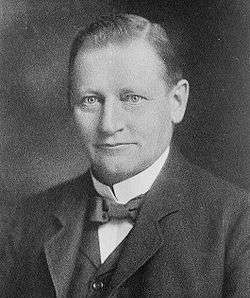Albrecht Penck
| Albrecht Penck | |
|---|---|
 | |
| Born |
25 September 1858 Reudnitz, Saxony |
| Died | March 7, 1945 (aged 86) |
| Residence | Austria-Hungary |
| Fields | Geomorphology, Quaternary science, Climatology |
| Institutions |
University of Vienna Harvard University Humboldt University |
| Alma mater |
University of Leipzig University of Vienna |
| Doctoral advisor | Eduard Suess |
| Influences |
Eduard Suess[1] Walther Penck[2] |
| Influenced | Walther Penck[3] |
| Notable awards |
Charles P. Daly Medal (1914) Vega Medal (1923) |
Albrecht Penck (September 25, 1858 – March 7, 1945), was a German geographer and geologist and the father of Walther Penck.
Biography
Born in Reudnitz near Leipzig, Penck became a university professor in Vienna from 1885 to 1906, and in Berlin from 1906 to 1927. There he was also the director of the "Institute and Museum for Oceanography" by 1918. He dedicated himself to geomorphology and climatology and raised the international profile of the "Vienna School of physical geography".
With Eduard Bruckner, he was co-author of Die Alpen im Eiszeitalter, a work in which the two scientists identified the four ice ages of the European Pleistocene (Gunz, Mindel, Riss, Würm); these being named after the river valleys that were the first indication of each glaciation.[4]
Since 1886, he was married to the sister of the successful Bavarian regional writer Ludwig Ganghofer. In 1945, Penck died in Prague. In memory of Penck, the painter and sculptor Ralf Winkler adopted the nom de plume A. R. Penck in 1966.
Albrecht Penck was elected a member of the Royal Swedish Academy of Sciences in 1905 and awarded the Founder's Gold Medal of the Royal Geographical Society in 1914.[5]
Legacy
The glacier of Penckbreen in Wedel Jarlsberg Land at Spitsbergen, Svalbard is named after him.[6] Since 1858 the "Albrecht-Penck-Medaille" is awarded by the Deutsche Quartärvereinigung for accomplishments associated with Quaternary science.[7]
Works
- Morphologie der Erdoberfläche; 2 vols, 1894
- (with Eduard Bruckner) Die Alpen im Eiszeitalter; 3 vols, 1909
- Die Gipfelflur der Alpen (1919)
- With geographer Eduard Richter, he was editor of the Atlas der Österreichischen Alpenseen (Atlas of the Austrian Alpine Lakes, 1895).[8]
- International Map of the World[9]
Further reading
- Schultz, H.-D.: "Ein wachsendes Volk braucht Raum." Albrecht Penck als politischer Geograph. In: Nitz, B.; Schultz, H.-D.; Schulz, M. (Hrsg.): 1810 – 2010: 200 Jahre Geographie in Berlin (= Berliner Geographische Arbeiten, Vol. 115). Berlin 2010, pp. 91–135 [2. verb. u. erw. Aufl. 2011, pp. 99–153]
- Henniges, N.: "Sehen lernen": Die Exkursionen des Wiener Geographischen Instituts und die Formierung der Praxiskultur der geographischen (Feld-) Beobachtung in der Ära Albrecht Penck (1885-1906). In: Mitteilungen der Österreichischen Geographischen Gesellschaft, Vol. 156, Wien 2014, pp. 141–170.
- Henniges, N.: "Naturgesetze der Kultur“: Die Wiener Geographen und die Ursprünge der „Volks- und Kulturbodentheorie“. In: ACME: An International E-Journal for Critical Geographies, Vol. 14, H. 4, 2015, pp. 1309–1351. [http://acme-journal.org/index.php/acme/article/view/1076''ACME: An International E-Journal for Critical Geographies''].
Citations
- ↑ Chorley et al. 1963
- ↑ Chorley et al. 2005, p. 589
- ↑ Chorley et al. 2005, p. 614
- ↑ A to Z of Marine Scientists by Barbara Charton
- ↑ "List of Past Gold Medal Winners" (PDF). Royal Geographical Society. Archived from the original (PDF) on 27 September 2011. Retrieved 24 August 2015.
- ↑ "Penckbreen (Svalbard)". Norwegian Polar Institute. Retrieved 4 March 2015.
- ↑ Penck, Friedrich Karl Albrecht Deutsche Biographie
- ↑ Google Books Atlas der Österreichischen Alpenseen
- ↑ Great maps. [S.l.]: Dk Publishing. 2014. p. 212. ISBN 978-1-4654-2463-1.
References
- Chorley, Richard J. (1963), "Diastrophic Background to Twentieth-Century Geomorphological Thought", Geological Society of America Bulletin, 74 (8): 953–970, doi:10.1130/0016-7606(1963)74[953:dbttgt]2.0.co;2
- Chorley, Richard J.; Beckinsale, Robert P.; Dunn, Antony J. (2005) [1973]. "Chapter Twenty-Two". The History of the Study of Landforms. Volume Two. Taylor & Francis e-Library.